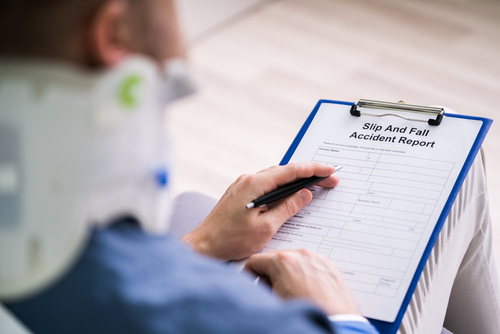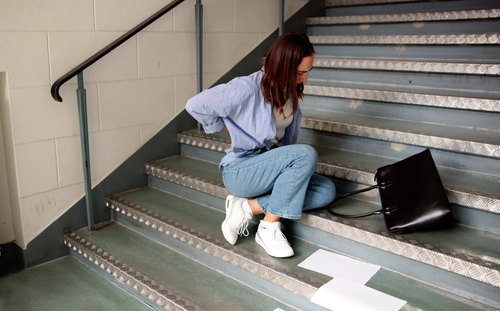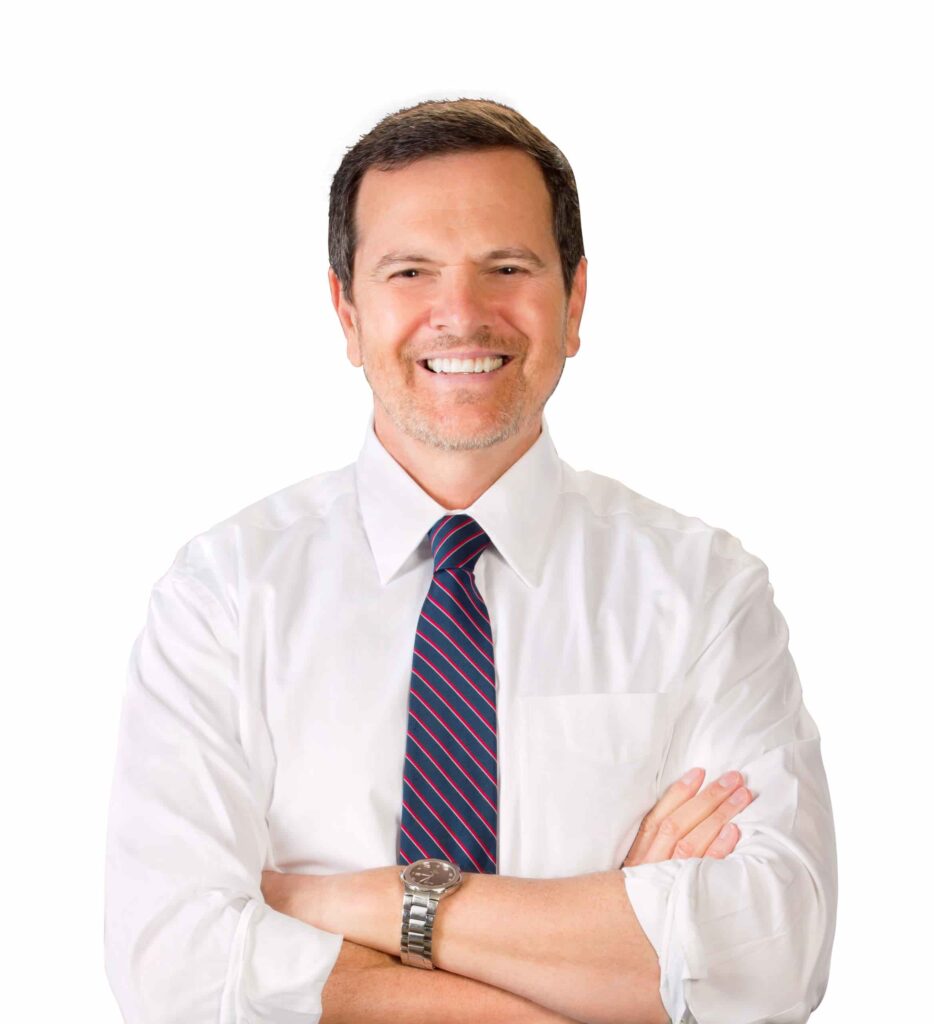Steven A. Bagen | October 13, 2025 | Personal Injury

A slip and fall claim against a major grocery store in Florida requires you to prove the business had actual or constructive knowledge of the dangerous condition and should have fixed it. Gainesville slip and fall accident lawyer can help you gather the evidence needed to prove negligence. Under Florida Statutes § 768.0755, this is the central challenge in any case involving a “transitory foreign substance,” which is a legal term for a temporary hazard such as a spilled liquid or dropped item.
Proving what the store should have known is difficult. Stores like Publix and Walmart are not required to give you their surveillance footage or internal maintenance records just because you ask. You need a formal legal process to obtain this evidence.
While proving your case is difficult, it is not impossible. With a thorough investigation, it is possible to hold these large retailers accountable and pursue the maximum compensation available under the law for your injuries. Our firm has years of experience handling these specific types of claims.
If you have a question about a fall at a grocery store, call us at (800) 800-2575.
Key Takeaways for Grocery Store Slip and Fall Claims
- Proving the store knew about the hazard is the core of your case. Florida law requires you to show the store had “actual or constructive knowledge” of the dangerous condition, which is a high standard of proof.
- Act quickly, as evidence disappears fast. Security footage is recorded over, sometimes in as little as 72 hours, so it is essential to send a legal demand to preserve this evidence immediately.
- The store’s insurer will try to blame you for the fall. Under Florida’s comparative negligence rule, any percentage of fault assigned to you directly reduces your compensation, making it vital to counter these arguments effectively.
The Biggest Hurdle in Your Case: Proving the Store Knew About the Hazard

After a fall, the store manager may have been apologetic and helpful. But in the days that follow, you may hear something very different from their insurance company or corporate office. They might claim they had no idea the hazard that caused you to fall even existed, raising questions about who is liable in a slip and fall accident and what evidence is needed to prove it.
This is a specific legal defense aimed at a key part of Florida’s premises liability law. The entire strength of your case hinges on overcoming this single point. Successfully holding a large retailer accountable means showing that their denial is not credible and that they did, in fact, fail in their duty to keep you safe.
Why is This So Hard to Prove in Florida?
The law in Florida requires you, the injured person, to show that the business knew or should have known about the dangerous condition. This responsibility is broken down into two types of “knowledge.”
- Actual Knowledge: This is the most direct but also the rarest to prove. It means showing that an employee literally saw the spill, was directly told about it by another customer, or was the one who created the hazard in the first place. Unless an employee confesses, this is exceptionally difficult to establish.
- Constructive Knowledge: This is the more common path to a successful claim. It is a legal concept that means the store should have discovered the hazard through reasonable care and attention. To prove constructive knowledge, we typically need to show one of two things:
- The dangerous condition was there for such a long period of time that employees conducting regular safety checks should have found and fixed it.
- The condition or event happened with such regularity that the store should have anticipated it and taken steps to prevent it (for example, putting down mats on a rainy day).
Think of it like this: if a carton of milk is dropped and spills in an aisle, it is not the store’s fault in that first second. But if that spill is left to pool on the floor for 45 minutes while employees walk past, a reasonably careful store owner would have found and cleaned it up. The failure to do so is negligence. It is that gap in time—between when the hazard appeared and when you fell—that becomes the focus of our investigation.
How We Establish What the Store Should Have Known
Large retailers like Walmart and Publix have established procedures for dealing with slip and fall incidents, and these procedures are designed to protect the company. They will not voluntarily hand over evidence that proves their own carelessness. You need a lawyer after a slip and fall because our firm handles this formal evidence-gathering process for you. We will:
- Send a Spoliation Letter: The first thing we do is send a formal notice to the company’s legal department. This letter demands that they preserve all evidence related to your fall, including surveillance video, employee schedules, incident reports, and any photographs taken at the scene. This prevents them from legally destroying evidence, such as letting video footage get recorded over.
- Request Maintenance Logs: Grocery stores typically require employees to conduct and log safety sweeps of the premises. We formally request these documents. Gaps in these logs, or logs that appear to be filled out all at once, is powerful evidence that safety procedures were not being followed.
- Depose Employees: We question managers and employees under oath in a formal proceeding called a deposition. We ask specific questions about their training, their safety responsibilities, and their actions on the day you were injured.
- Gather Witness Statements: We will reach out to anyone who may have seen your fall or who witnessed the hazardous condition on the floor before you encountered it. An independent witness is invaluable.
What Is a Grocery Store Slip and Fall Claim Actually Worth?
With slip and fall accidents accounting for a significant number of personal injury claims, insurers have developed standard methods for categorizing these damages. A strong case is one where every single loss is identified and supported with clear evidence.
The Two Types of Damages to Pursue
When our firm builds a claim, we separate your losses into two main categories. This ensures nothing is overlooked.
- Economic Damages: These are the direct financial losses that have a clear and specific dollar amount attached to them. We gather every bill, receipt, and pay stub to calculate this total. This includes:
- Medical Expenses: Every dollar you have spent on healthcare related to the fall, from the initial emergency room visit to surgeries, physical therapy, medication, and any future medical care you are expected to need.
- Lost Wages: The income you have lost from being unable to work during your recovery.
- Loss of Earning Capacity: If your injury is so severe that it prevents you from returning to your previous job or working at the same capacity, this damage covers the projected difference in your lifetime earnings.
- Non-Economic Damages: These are the intangible losses that do not have a simple price tag but are just as real and damaging. Their value is based on the severity and permanency of your injuries and how they affect your life. This includes:
- Pain and Suffering: Compensation for the physical pain and emotional distress caused by the injury and the medical treatment for it.
- Mental Anguish: This includes compensation for conditions like anxiety, depression, or post-traumatic stress that develop as a result of the trauma of the fall and its consequences.
- Loss of Enjoyment of Life: This addresses how the injury impacts your ability to participate in hobbies, social activities, and the daily routines you once enjoyed.
What If the Store Tries to Blame You for the Fall?
Soon after your fall, you may get a call from an insurance adjuster representing the grocery store. The adjuster may sound friendly and concerned, but understand their role. They may ask you questions like: “What kind of shoes were you wearing?” “Were you looking at your phone?” “Did you see the spill at all before you fell?” These questions are carefully designed to test your understanding of slip and fall laws and to find ways to reduce or deny your claim.
These questions are not asked out of simple curiosity. They are part of a trained investigation to see if any blame for the fall may be shifted onto you.
Understanding Florida’s Comparative Negligence Rule
Florida uses a legal rule known as “pure comparative negligence.” Simply put, this rule allows a jury to assign a percentage of fault to each person involved in an accident. That percentage then directly impacts the amount of compensation you receive.
The store’s insurance company is well aware of this rule. Their business goal is to pay out as little as possible on claims, and one of the most effective ways to do that is by shifting blame onto the injured person. They may argue that the hazard was “open and obvious,” suggesting you should have easily seen and avoided it, or that your own inattention was the primary cause of the incident.
How We Protect You From Unfair Blame
Our role is to anticipate these arguments and build a case that clearly demonstrates the store’s responsibility. We work to focus the investigation on the store’s failures, not your actions in the moments before the fall. A hazard is not “open and obvious” if other factors prevented you from seeing it.
For example, we demonstrate that:
- The lighting in that particular aisle was too poor to see a clear liquid on a polished floor.
- The store had placed a large, temporary product display that blocked your view of the floor ahead.
- You had no reason to be looking down at your feet or expecting a slippery substance in the middle of the main walkway.
By building a factual narrative of the store’s negligence, we work to ensure that no amount of fault is unjustly assigned to you, thereby protecting the full value of your claim.
The Clock is Ticking: Why You Cannot Afford to Wait

After a serious fall, it feels like you have a million things to manage, from doctor’s appointments to figuring out how to pay your bills. Amid this stress, it is easy to put off thinking about legal matters. However, there are two important deadlines working against you from the very first day. One is a formal legal deadline, and the other is a practical one.
Point 1: The Formal Statute of Limitations
Under a law recently updated in 2023, Florida Statutes Chapter 95 now gives you just two years from the date of the incident to file a personal injury lawsuit. If you miss this deadline, the court will refuse to hear your case, and you will lose your right to pursue compensation forever. While two years might sound like a long time, building a strong, evidence-rich case against a major corporation takes many months of investigation and preparation.
Point 2: The Unofficial Deadline for Evidence
This is the more immediate and pressing concern. Key evidence that proves your case has a very short shelf life. Security camera footage, which could show exactly how long a spill was on the floor, is typically recorded over on a regular cycle—sometimes in as little as 72 hours. Publix, Walmart, and other large retailers are not obligated to save this footage for you unless they receive a formal legal demand to do so.
Beyond video, other evidence disappears quickly. Witnesses’ memories fade over time. Employees who saw what happened may quit their jobs or be transferred to another store, making them difficult to find. The sooner a professional investigation begins, the stronger the evidence will be.
Take This Step to Protect Your Claim
Contact a law firm with experience in these cases to allow for the immediate sending of a preservation-of-evidence letter. This legally obligates the store to save all information relevant to your fall, from video files to digital maintenance logs. It is the first and most time-sensitive step in building a successful grocery store slip and fall claim.
Frequently Asked Questions About Grocery Store Falls
Do I still have a case if the store put out a “wet floor” sign?
Possibly. A sign does not automatically protect a store from liability. We would need to investigate if the sign was placed in a visible, prominent location and if it was reasonable to expect you to have seen it. In some cases, a single, small sign is not legally sufficient to warn customers of a large or particularly dangerous hazardous area. Personal injury lawyers handle these evaluations carefully to determine whether the store’s warning met legal standards or failed to provide adequate notice of the hazard.
What if I don’t know what caused me to fall?
This is a common situation. A “transitory foreign substance” might be a clear, slippery liquid like water or cleaning solution that is very difficult to see on a polished floor. Part of our investigation is to identify the substance by carefully reviewing surveillance footage, witness statements, and the store’s own internal records, which might include reports of broken or spilled products.
Should I give a recorded statement to the store’s insurance company?
No. We strongly advise you to never give a recorded statement to an opposing insurance company without legal representation. Insurance adjusters are trained to ask leading questions designed to get you to say something that weakens your claim. We will handle all communications with the insurer on your behalf.
What if my fall happened in the parking lot?
The same legal principles of premises liability apply. The grocery store is responsible for maintaining its parking lot in a reasonably safe condition for its customers. This includes fixing or warning customers about hazards like large potholes, broken wheel stops, poor lighting, or cracked and uneven pavement.
Don’t Let a Grocery Store Tell You What Your Claim is Worth

You have legal rights, and there is a clear process for holding a negligent business accountable.
Call us today for a free, no-obligation review of your case. Let’s talk about what happened and how we can help. Call (800) 800-2575.
